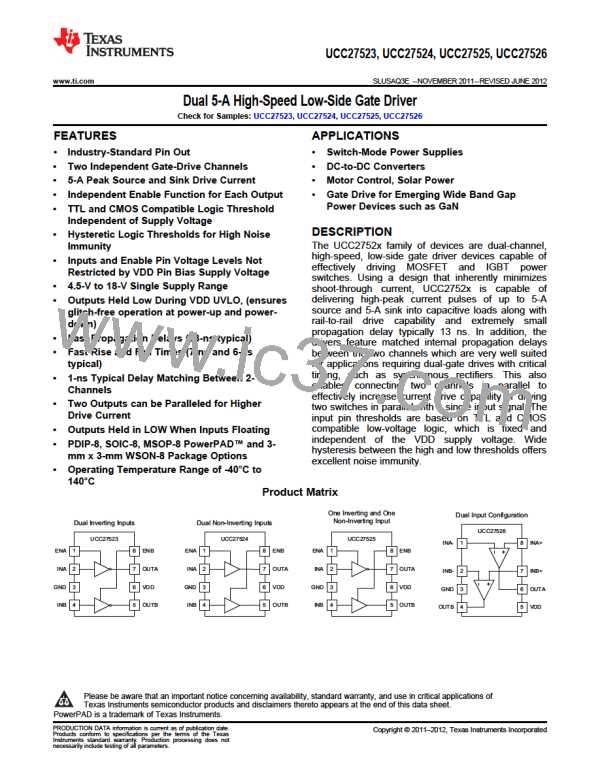UCC27523, UCC27524, UCC27525, UCC27526
www.ti.com
SLUSAQ3E –NOVEMBER 2011–REVISED JUNE 2012
Enable Function
The enable function is an extremely beneficial feature in gate driver devices especially for certain applications
such as synchronous rectification where the driver outputs can be disabled in light-load conditions to prevent
negative current circulation and to improve light-load efficiency.
UCC27523/4/5 devices are provided with independent enable pins ENx for exclusive control of each driver
channel operation. The enable pins are based on a non-inverting configuration (active high operation). Thus
when ENx pins are driven high the drivers are enabled and when ENx pins are driven low the drivers are
disabled. Like the input pins, the enable pins are also based on a TTL/CMOS compatible input threshold logic
that is independent of the supply voltage and can be effectively controlled using logic signals from 3.3-V and 5-V
microcontrollers. The UCC2752X devices also feature tight control of the Enable function threshold voltage levels
which eases system design considerations and ensures stable operation across temperature (refer to Figure 15).
The ENx pins are internally pulled up to VDD using pull-up resistors as a result of which the outputs of the device
are enabled in the default state. Hence the ENx pins can be left floating or Not Connected (N/C) for standard
operation, where the enable feature is not needed. Essentially, this allows the UCC27523/4/5 devices to be pin-
to-pin compatible with TI’s previous generation drivers UCC27323/4/5 respectively, where pins #1, 8 are N/C
pins. If the channel A and Channel B inputs and outputs are connected in parallel to increase the driver current
capacity, ENA and ENB should be connected and driven together.
The UCC27526 device does not feature dedicated enable pins. However, as mentioned earlier, an
enable/disable function can be easily implemented in UCC27526 using the unused input pin. When INx+ is
pulled-down to GND or INx- is pulled-down to VDD, the output is disabled. Thus INx+ pin can be used like an
enable pin that is based on active high logic, while INx- can be used like an enable pin that is based on active
low logic. It is important to note that while the ENA, ENB pins in UCC27523/4/5 are allowed to be in floating
condition during standard operation and the outputs will be enabled, the INx+, INx- pins in UCC27526 are not
allowed to be floating since this will disable the outputs.
Copyright © 2011–2012, Texas Instruments Incorporated
Submit Documentation Feedback
19
Product Folder Link(s): UCC27523, UCC27524, UCC27525, UCC27526

 TI [ TEXAS INSTRUMENTS ]
TI [ TEXAS INSTRUMENTS ]